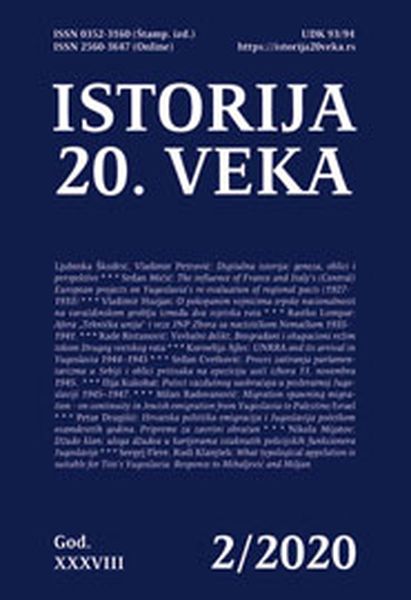WHAT TYPOLOGICAL APPELLATION IS SUITABLE FOR TITO’S YUGOSLAVIA: RESPONSE TO MIHALJEVIĆ AND MILJAN
WHAT TYPOLOGICAL APPELLATION IS SUITABLE FOR TITO’S YUGOSLAVIA: RESPONSE TO MIHALJEVIĆ AND MILJAN
Author(s): Sergej FlereSubject(s): History, Modern Age, Recent History (1900 till today)
Published by: Institut za savremenu istoriju, Beograd
Keywords: Authoritarianism; Josip Broz Tito; Communism; Consociation; Federation; Political System; Totalitarianism; Unitarianism; Yugoslavia;
Summary/Abstract: This paper discusses the counterfactual, scientifically unfounded and unscholarly statements by Mihaljević and Miljan in their paper “Was Tito’s Yugoslavia not Totalitarian?” We needed to consider the issues of: Totalitarianism as a scholarly concept and a social construct, which could at best fit Yugoslavia’s political life in the period 1945-1962 (1966). The typological characterization of Tito’s Yugoslavia, where there is substantial agreement among scholars that consociation fits it best (at least for the period beginning in the mid-sixties). Along with numerous authors noted, we find that all elements of a predetermined consociation were present, including the grand coalition at the federal level, decision making at the federal level, the autonomy of units in cultural matters, and other; the organization of security services in Yugoslavia of the period (where we found multiplicity of organizations that did not always operate in harmony), the role of the republics in conducting foreign policy, which kept increasing, contrary to what Mihaljević and Miljan explicitly maintained with respect to Croatia; The monetary policy and seigniorage which came about (particularly explaining inflation of the 1980s). In its endeavor to achieve “settled accounts,” the federal government was stripped of any money issuing, but the money “leaked” into federal and republic national banks, which our critics were completely unaware of, not only making use of a wrong characterization, but also spelling it incorrectly; the issue of the political system’s dynamics (there were very substantial changes in the period 1945-1991). It was primarily a case of increasing decentralization in an attempt to do away with any “apples of discord” in mutual relationships (particularly in the distribution of economic goods), which proved impossible; the issue of the political system’s legitimacy, which is a slippery scientific notion, although its presence in certain forms could well be corroborated. We also noted a number of minor mistakes, errors, and omissions by the authors at issue. We found a general failure by the authors to achieve scientific objectivity and master the notions necessary for analysis.
Journal: Istorija 20. veka
- Issue Year: 2020
- Issue No: 2
- Page Range: 231-244
- Page Count: 14
- Language: English

